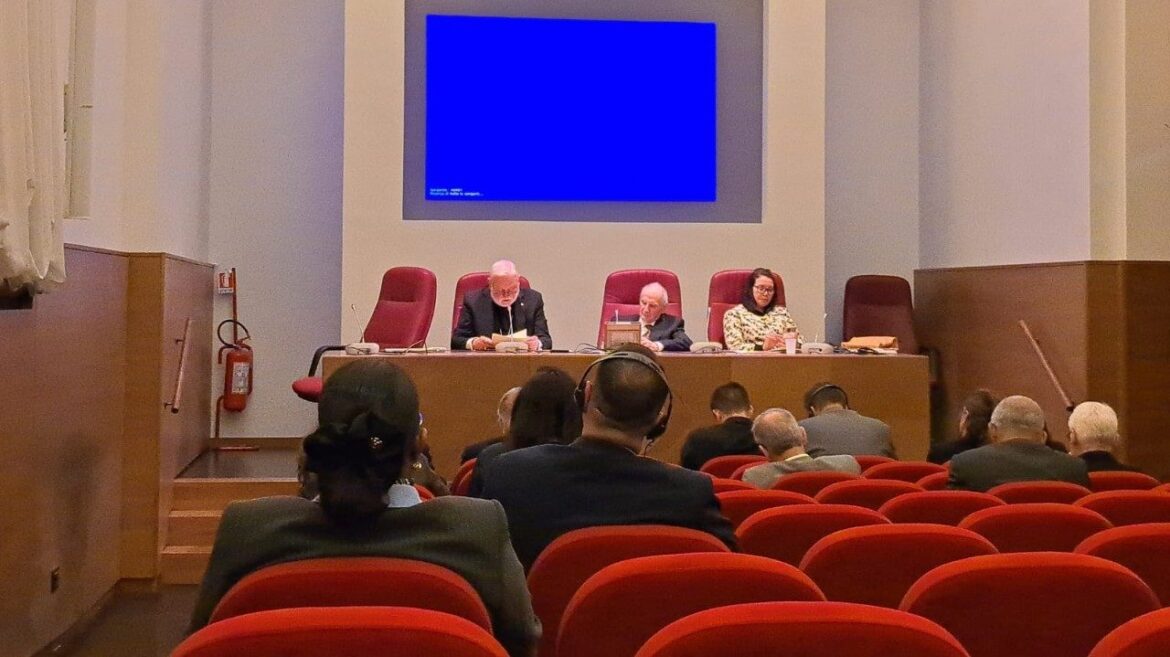
Archbishop Paul Richard Gallagher gives a talk on how the Holy See’s diplomacy focuses on translating hope into a “diplomatic act” and on the importance of “becoming a neighbour” to serve the common good.
By Edoardo Giribaldi
“Becoming a neighbour” is the deeper meaning of diplomacy at the service of the common good, and not of particular interests.
Archbishop Paul Richard Gallagher, Secretary for Relations with States and International Organizations, emphasized how this is the perspective that guides the Holy See’s actions in its relations with states in a speech given on Monday, October 13, as part of the conference “Becoming neighbours in hope: the witness of religions and the diplomacy of political charity”.
Organized by the Pontifical Association, “Carità Politica” (”Political Charity”), the event took place in the San Callisto Palace, close to the Vatican. “Religions and Diplomacy” is a body created thirty years ago to promote, coordinate, and strengthen interreligious dialogue, particularly through collaboration with various ambassadors to the Holy See.
Even in the most “crystallized” situations, papal diplomacy refuses resignation and adopts a double approach—addressing immediate crises while at the same time building a long-term vision that transcends “electoral cycles”, the Archbishop explained.
This is not a luxury, but a strategic necessity, which also entails risks. Maintaining relations with the vast majority of the world’s countries can, in fact, lead to perceptions of the Holy See being “excessively accommodating toward authoritarian regimes,” but diplomatic presence remains “the only way to influence systems that are otherwise difficult to reach”, he continued.
Translating hope into a “diplomatic act”
According to Archbishop Gallagher, being close is at the heart of diplomacy. “When the Pope receives the credentials of an ambassador,” he said, “we are embodying a principle that goes beyond mere protocol”.
The Holy See’s diplomacy, is based on an “active neutrality,” the Secretary for Relations with States explained, which does not mean indifference but commitment to human stability and the “common good,” beyond “particular interests”, geopolitical blocs, and ideological frameworks—“which are increasingly hard to identify today.”
The Gospel parable of the Good Samaritan thus becomes a model for action, as it means “taking on concrete and lasting responsibility for the wounded man”, Archbishop Gallagher highlighted. He mentioned some examples of when this has been reflected in papal diplomacy, such as the role the Holy See played in the rapprochement between the United States and Cuba, the peace process in Colombia, or the patient construction of relations with Vietnam and China.
Every intervention by the Holy See is aimed at promoting the common good and translating hope into a “concrete diplomatic act”, the Archbishop insisted. Not simply a “naive optimism,” but action based “on risk assessment,” which rejects “resignation” and the assumption that there is no room for dialogue or for change in even the most “crystallized” situations.
Urgency and long-term vision
Vatican diplomacy operates on two temporal levels: on the one hand, it responds to immediate emergencies—crises, conflicts, humanitarian situations—and on the other, it maintains a long-term vision, not bound by electoral cycles.“This is not a luxury, but a strategic necessity”, because without broader hope, solutions remain fragile, the Secretary emphasized. Referring to ongoing conflicts and tensions in the geopolitical landscape, he acknowledged the difficulties of mediation and the complexity of “global stabilization.”
Archbishop Gallagher also underlined the challenges of rapid technological developments and the ecological crisis, which require “new frameworks of cooperation” that cannot be created by a single state but which are often hard to implement. These issues, he noted, could become “catalysts” for multilateralism, but that is not always the case.
Dialogue, listening, and moral costs
Maintaining relationships with the vast majority of countries in the world sometimes risks being perceived as “too accommodating toward authoritarian regimes”, the Secretary for Relations with States observed. However, diplomatic presence is “the only way” to influence systems that would otherwise be “difficult to reach.”
The moral authority of the Holy See—stemming from its lack of material interests—allows it to recall the importance of ethical principles “even when uncomfortable”, Archbishop Gallagher highlighted. Listening, however, is “not always guaranteed”, as appeals can go unheard, especially when they clash with “immediate geopolitical interests.”
Diplomatic decisions can also entail “high moral costs”, he continued, adding that it is rarely a matter of choosing between “absolute good and absolute evil.” In this sense, neutrality can be seen as an obstacle when circumstances might call for “stronger stances”, but the conviction that keeping channels open can ultimately lead to “more effective interventions than public condemnations” remains central, Archbishop Gallagher said.
Migration, peace, and multilateralism
Among the topics discussed, the Secretary for Relations with States also spoke about migration, saying this issue must be approached with an “integral perspective” capable of analyzing root causes and transforming emergencies into opportunities.
Regarding armed conflicts and the “third world war fought piecemeal”, often mentioned by Pope Francis, the Archbishop called for the development of a “theology of peace” that goes beyond the mere absence of war and focuses on building just relationships among peoples.
The Secretary for Relations with States emphasized how interreligious dialogue remains a key area for pontifical diplomacy, as does the promotion of multilateralism—not as an ideology, but as a conviction: “Global challenges, from the pandemic to the climate crisis, cannot be faced alone.”
This is a working translation from the original Italian article.

